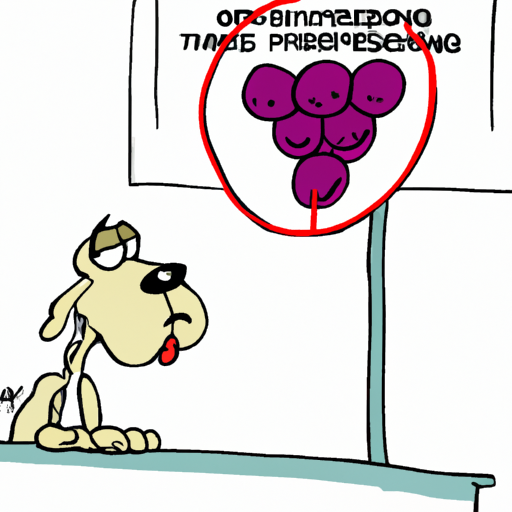It’s a question that many dog owners have asked themselves: why can’t dogs eat grapes? While these small fruits may seem harmless, they can actually be deadly for our furry friends. In this article, we’ll dive into the reasons behind this, the symptoms of grape toxicity, and what to do if your dog accidentally ingests grapes.
Table of Contents
- The Danger of Grapes
- Why Grapes are Toxic to Dogs
- Symptoms of Grape Toxicity in Dogs
- What to Do if Your Dog Eats Grapes
- Frequently Asked Questions
Key Takeaways
- Grapes are extremely toxic to dogs and can lead to acute kidney failure.
- The exact substance in grapes that causes toxicity in dogs is unknown.
- If a dog ingests grapes, immediate veterinary attention is crucial.
- Prevention is key: Keep grapes and raisins out of reach of your dog.
The Danger of Grapes
You may have heard that certain foods are off-limits for dogs, and grapes are one of those. But why? The main reason is that grapes (and their dried counterparts, raisins) are known to cause kidney failure in dogs, a condition known as acute kidney injury (AKI). It’s not just the flesh of the grape that’s harmful; the skin, pulp, seeds, and even the vine can also be toxic.
As vets at VCA Hospitals explain, even small amounts of grapes or raisins can be fatal for a dog. There have been cases where dogs that ate just a single grape experienced severe health problems.
Why Grapes are Toxic to Dogs
Despite extensive research, the exact substance in grapes that causes toxicity in dogs remains a mystery. However, what we do know is that the toxic effect is not dose-dependent. This means that even a small amount can cause severe illness in some dogs, while others may ingest a larger quantity and show no ill effects.
It’s also worth noting that toxicity can occur from both fresh grapes and raisins. So, whether you’re enjoying a fresh bunch of grapes or a slice of raisin bread, it’s essential to keep these foods out of reach.
To understand more about the foods your dog should avoid, check out this article on OneTopDog.
Symptoms of Grape Toxicity in Dogs
The signs of grape toxicity in dogs can vary but typically include vomiting, diarrhea, and lethargy. You might also notice that your dog has lost their appetite, seems unusually quiet, or is showing signs of abdominal pain.
In more severe cases, dogs may experience acute kidney failure, which can lead to increased thirst, frequent urination, or a lack of urine production. If you notice any of these symptoms and suspect that your dog might have ingested grapes, you should seek veterinary attention immediately.
Find out more about the signs and symptoms of grape toxicity in this helpful guide from OneTopDog.
What to Do if Your Dog Eats Grapes
If you think your dog has eaten grapes, the first thing you should do is contact your vet or the ASPCA Animal Poison Control Center. They can provide advice and may recommend inducing vomiting. However, you should never try to make your dog vomit without professional guidance.
Once at the vet, they may perform a variety of tests, including blood tests and urine analysis, to determine the level of toxicity. Treatment typically involves inducing vomiting, administering activated charcoal, and providing intravenous fluids.
Remember, the sooner treatment is started, the better the outcome. To learn more about what to do if your dog ingests a toxic substance, read this article on OneTopDog.
Frequently Asked Questions
1. Are all types of grapes toxic to dogs?
Yes, all types of grapes, including red, green, seedless, and those used to make wine, are toxic to dogs.
2. Can dogs eat grape-flavored food?
It’s best to avoid giving your dog any food with grape flavoring. Many grape-flavored foods contain actual grape products, which could potentially be harmful.
3. Can dogs eat grape leaves or vines?
No, grape leaves and vines are also potentially toxic to dogs.
4. What other fruits are harmful to dogs?
Other fruits that are harmful to dogs include cherries, avocados, and some parts of apples. Always do your research before feeding your dog any kind of fruit.
In conclusion, while the exact reason why grapes are toxic to dogs remains unknown, it’s clear that they pose a serious health risk. If you’re a dog owner, it’s essential to keep grapes and all grape products out of your dog’s reach, and to seek immediate veterinary attention if your dog does ingest grapes. Remember, when it comes to your dog’s health, it’s always better to be safe than sorry.



